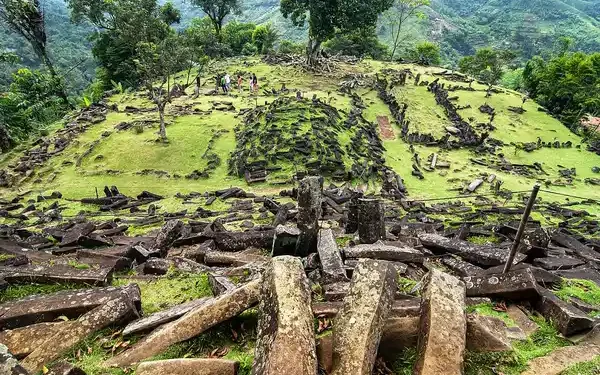Is the Gunung Padang pyramid the oldest in the world?
High in the hills of West Java lies Gunung Padang, a remote site cloaked in grass and mystery. Long considered a sacred megalithic terrace, this mountain may actually hide something far more astonishing beneath its surface—a pyramid built thousands of years before any known civilization existed.
A Monument Buried Beneath Layers of Time
Gunung Padang has been known to archaeologists since the early 20th century. First mentioned in a 1914 report by the Dutch colonial Department of Antiquities and later revisited in 1949, the site has long been regarded as the largest megalithic complex in Southeast Asia. But new research suggests its real significance has been buried beneath the surface all along.
A recent study presented at the American Geophysical Union’s 2018 Fall Meeting in Washington, DC, argues that Gunung Padang is not just a hill with terraces—it’s a massive, layered pyramid constructed in multiple prehistoric phases. Using ground-penetrating radar, seismic tomography, core drilling, and archaeological excavations, researchers have uncovered a complex structure that challenges our understanding of early human engineering.
The outermost layer—what visitors see today—is made of columnar basalt rocks arranged into terraces and paths, dated to approximately 3,500 years ago. Beneath this lies a second layer, previously thought to be a natural formation, but now identified as a deliberate matrix of volcanic rock columns estimated to be around 8,000 years old.
Deeper still, scientists uncovered a third layer containing large hollow chambers and voids. And at the base lies a fourth layer—solidified basalt “lava tongue” rock that, according to the study, bears signs of human modification. Radiocarbon dating places the deepest sections between 9,500 and 28,000 years old.
If True, the Gunung Padang Pyramid Changes Everything
This timeline would place Gunung Padang’s construction well before the accepted rise of human civilization, which is traditionally traced to the end of the last Ice Age, around 11,500 BC. If the deeper layers of this structure are indeed man-made, it would suggest that advanced architectural activity was taking place at least 10,000 years earlier than believed—possibly as far back as 28,000 years ago.
The implications are profound. Not only would this challenge mainstream archaeological theories, it would also force a reconsideration of what prehistoric societies were capable of. Lead researcher Danny Hilman Natawidjaja, a geophysicist with Indonesia’s National Research and Innovation Agency, has proposed that Gunung Padang may have served as a sacred site or temple built by a forgotten culture with engineering knowledge far exceeding expectations for that era.
Skeptics have urged caution, noting that the findings have yet to be peer-reviewed and must withstand rigorous scientific scrutiny. But the evidence presented so far is hard to ignore: a multi-phase construction site with increasingly ancient layers, each suggesting human intervention.
If verified, Gunung Padang would not only be the oldest pyramid ever discovered, but it would be one of the most significant archaeological revelations in history. Nevertheless, the claim is steeped in controversy. Many experts remain skeptical, largely because the study has not yet undergone formal peer review and relies heavily on geophysical interpretations rather than direct excavation of the deepest layers.
Critics also argue that some of the structures identified as man-made could be natural geological formations misinterpreted as artificial. Until further excavation, documentation, and independent verification take place, the true nature—and age—of the Gunung Padang pyramid remains an open and hotly debated question.











